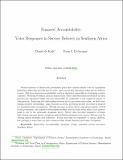Nuanced Accountability: Voter Responses to Service Delivery in Southern Africa
Author(s)
De Kadt, Daniel Nicolas Jacques; Lieberman, Evan S
Downloadd27605fe9997a456bcf8a2d87e30111d3ea5.pdf (710.0Kb)
OPEN_ACCESS_POLICY
Open Access Policy
Creative Commons Attribution-Noncommercial-Share Alike
Terms of use
Metadata
Show full item recordAbstract
Various theories of democratic governance posit that citizens should vote for incumbent politicians when they provide good service, and vote for the opposition when service delivery is poor. But does electoral accountability work as theorized, especially in developing country contexts? Studying Southern African democracies, where infrastructural investment in basic services has expanded widely but not universally, we contribute a new empirical answer to this question. Analyzing the relationship between service provision and voting, we find a surprising negative relationship: improvements in service provision predict decreases in support for dominant party incumbents. Though stronger in areas where opposition parties control local government, the negative relationship persists even in those areas where local government is run by the nationally dominant party. Survey data provides suggestive evidence that citizen concerns about corruption and ratcheting preferences for service delivery may be driving citizen attitudes and behaviors. Voters may thus be responsive to service delivery, but perhaps in ways that are more nuanced than extant theories previously recognized.
Date issued
2017-12Department
Massachusetts Institute of Technology. Department of Political ScienceJournal
British Journal of Political Science
Publisher
Cambridge University Press (CUP)
Citation
De Kadt, Daniel, and Evan S. Lieberman. “Nuanced Accountability: Voter Responses to Service Delivery in Southern Africa.” British Journal of Political Science (December 13, 2017): 1–31.
Version: Author's final manuscript
ISSN
0007-1234
1469-2112